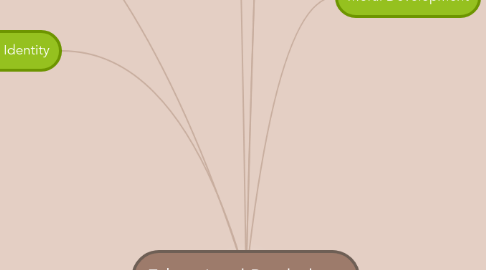
1. Types of Research
1.1. Descriptive- The purpose of this research is to inform what is happening. Some examples consist of surveys, interviews, case studies, or observations.
1.1.1. Con-The problem with this type of research is that you are relying on other people, and results may be skewed.
1.1.2. Pro- This type of study is helpful to a researcher that doesn't have access to major observation tools. Someone who doesn't have a lab or doesn't have permission to do studies on individuals could benefit from this.
1.2. Correlational- The purpose of this type of research is to connect two different variables together. As the researcher relates one to another the interaction between the two becomes apparent.
1.2.1. Pro- This technique keeps the researcher from starting from scratch
1.2.2. Con- The problem with this method is just because a relationship exists doesn't mean the two variables correlate
1.3. Experimental-Research that is based on cause and effect. The researcher will manipulate one or more variables and keep the other variables controlled to determine the effect.
1.3.1. Pro- A is the treatment, B is the effect. There is a clear cut outcome.
1.3.2. Con- It is diffucult to replicate experimental results. This is because only a small group is tested.
2. Cultural Identity
2.1. Bronfenbrenner
2.1.1. Ecological Systems Theory- Bronfenbrenner came up with 5 environmental systems that influence how we act.
2.2. Cultural Proficiency
2.2.1. Cultural Proficiency has to do with interacting with people from different cultural or social- economical backgrounds. The stages consist of cultural destruction, incapacity, blindness, pre-competence, competence, with the end result being proficiency. Each step pushes the individual to the next realization which results in understanding.
3. Personal Identity
3.1. Self- Concept
3.1.1. This is who someone is. ie. Social class, ethnicity, and religion.
3.1.1.1. Self concept relates to culture because of how we view ourselves. It depends largely on where and how we are brought up in that setting. You connect with your city, your world, your everything. As a teacher you may not be able to relate to your students for example, family dynamics.
3.2. Self- Esteem
3.2.1. This is based on whether one values himself or herself as a person. It is a personal thought process about oneself.
3.2.1.1. Least control a teacher can have
3.3. Self- Efficacy
3.3.1. Self- Efficacy puts more emphasis the teacher. In order to achieve this you must focus on what the student CAN do instead of what they CAN’T do.
3.3.1.1. Most control you can have
4. Remaining Question
4.1. 1. From my own speculation- lately our culture seems to be focused on nurture based ideals. There seem to be more emotional problems with children in school then in the past. Is this because teachers are addressing the nurture sides of things, or is it because our culture is allowing emotions to be addressed out in the open (in previous times people tended to keep their problems to themselves.)
5. Cognitive Development
5.1. Nurture-
5.1.1. Vygotsky- believed that a person developed cognitively through their environment. ie. Influences from parents or teachers.
5.1.2. Gardner- has a theory with multiple intelligences. There are 8 criteria that must work all by themselves. This theory is evolution based.
5.1.2.1. For example, if a person has music intelligence, then they have the ability to learn quantum physics if taught through music.
5.2. Nature
5.2.1. Piaget- This psychologist believes that a persons cognitive ability is based off of what they are born with. He has 4 concrete stages that every individual goes through based off of age. If they do not fit into the boxes then there must be something wrong with them.
5.2.2. Spearman and Carrol- These individuals created the IQ test. They believe that what you're born with that's what you will always have.
5.3. Nature and Nurture
5.3.1. Sternberg- theory explains that everyone is born with 3 intelligences; book smarts, creativity, and common sense. We all are stronger in some areas then others, but an individuals weaknesses can be compensated by their strengths.
5.3.2. Brain based- This cognitive idea is based on nature and nurture. Nature says that the brain will develop throughout the maturation of one's life. Nurture is geared towards to guidance and influences of those surrounding- such as parents, grandparents, teachers etc.
6. Social and Emotional Development
6.1. Erikson
6.1.1. Erikson’s ideals were shaped by Freud and Piaget. He believed there are 8 stages of Development. These stages progressed based on maturation. With each stages an individual either gets a virtue or a negative trait.
6.2. Marcia
6.2.1. This theory deals with how we make significant life decisions
6.2.1.1. 1. Diffusion- Define a problem
6.2.1.2. 2. Moratorium- Explore the options
6.2.1.3. 3. Foreclosed- Compare the options against our own set of values
6.2.1.4. -->Achievement- Making the decision
6.3. Sywester
6.3.1. Our unconscious emotions can impact learning as well.
6.3.1.1. Because these acts are unconscious they are neither positive nor negative because we are not aware these things are happening to our emotions. They are unintentional.
6.3.1.1.1. Perceptible- you can tell someone is having a bad day because of body language
6.3.1.1.2. Responds- that person might have an outburst at you
6.3.1.1.3. Arousal- The smallest act on this day can set off high levels of emotions.
6.4. Goleman
6.4.1. When we have a high level of negative emotions then our emotions will hijack us.
7. Moral Development
7.1. Kohlberg
7.1.1. We can help others to move through the states- implies that we know how and what others need.
7.2. Gilligan
7.2.1. The perception is there is no correct answers when it comes to morals, but there is a connection between how one thinks and how one acts.
7.2.1.1. Still a stage theory- but moves into a corner of nurture.
7.3. Selman
7.3.1. See perspective of others- based on age. The older we are the better understanding we may have of another person. Built from Piaget. Morality based on something that occurs based on maturation. This is a nature theory.
